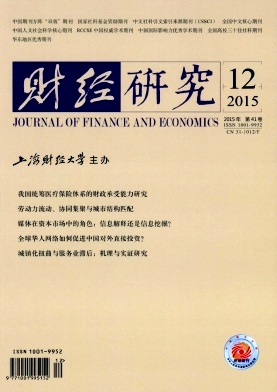汽车牌照配置的混合机制设计——对我国车牌配置机制改进的探讨
财经研究 2015 年 第 41 卷第 12 期, 页码:62 - 71
摘要
参考文献
摘要
文章在分析中国各城市车牌配置机制所存在缺陷的基础上,基于考虑预算约束条件的多物品拍卖理论模型,提出了能够涵盖中国现行主要车牌配置机制的一类包含统一保留价格的序贯拍卖-摇号混合机制。文章进一步讨论了车牌配置机制中引人关注的公平性含义,并使用数值模拟的实验方法从效率、收入和公平性三个维度对包含统一保留价格的序贯拍卖-摇号混合机制了进行评价。最后,文章结合上海市车牌配置机制改革的现实背景,考虑了将二手车牌纳入拍卖平台的情形,对上述混合机制做了进一步扩展。文章的研究结论为汽车牌照配置机制的改进和选择提供了理论基础和政策参考。
[1] Benoit J P, Krishna V. Multiple-object auctions with budget constrained bidders [J]. Review of Economic Studies, 2001,68(1):155-179.
[2] Che Y K, Gale I. Standard auctions with financially constrained bidders[J]. Review of Economic Studies, 1998, 65(1): 1-21.
[3] Che Y K, Gale I. The optimal mechanism for selling to a budget-constrained buyer[J]. Journal of Econo-mic Theory, 2000, 92(2): 198-233.
[4] Che Y K, Gale I, Kim J. Assigning resources to budget-constrained agents[J]. Review of Economic Studies, 2013, 80(1): 73-107.
[5] Chen X, Zhao J. Bidding to drive: Vehicle license auction policy in Shanghai and its public acceptance[J]. Transport Policy, 2013, 27: 39-52.
[6] Chu S F, Winston T, Koh H, et al. Expectations formation and forecasting of vehicle demand: An empi-rical study of the vehicle quota auctions in Singapore[J]. Transportation Research Part A: Policy and Practice, 2004, 38(5): 367-381.
[7] Condorelli D. Market and non-market mechanisms for the optimal allocation of scarce resources[J]. Games and Economic Behavior, 2013, 82: 582-591.
[8] Evans M, Vossler C, Flores N. Hybrid allocation mechanism for publicly provided goods[J]. Journal of Public Economics, 2009, 93(1): 311-325.
[9] Huang Y, Wen Q. Hybrid mechanism: Theory, practice and empirical analysis[R]. Working Paper, 2014.
[10] Koh W, Mariano R, Tse Y K. Open versus sealed bid auctions: Testing for revenue equivalence under Singapore's vehicle quota system[J]. Applied Economics, 2003, 39(1): 125-134.
[11] Krishna V.Auction theory[M]. Academic Press,2010.
[12] Li S. Better lucky than rich? Welfare analysis of automobile license allocations in Beijing and Shanghai[R]. Working Paper, 2014.
[13] Liao E Z, Holt C A. The pursuit of revenue reduction: An experimental analysis of the Shanghai license plate auction[R]. Working Paper, 2013.
[14] Pai M M, Vohra R. Optimal auctions with financially constrained buyers[J].Journal of Economic Theory, 2014, 150: 383-425.
[15] Phang S Y, Wong W K, Chia N C. Singapore's experience with car quotas: Issues and policy processes[J]. Transport Policy, 1996, 3(4): 145-153.
[16] Pitchik C, Schotter A. Perfect equilibria in budget-constrained sequential auctions: An experimental study[J]. Rand Journal of Economics, 1988, 19(3): 363-388.
[17] Pitchik C. Budget-constrained sequential auctions with incomplete information[J]. Games and Economic Behavior, 2009, 66(2): 928-949.
[18] Richter M. Mechanism design with budget constrains and a continuum of agents[R]. Working Paper, 2013.
[19] Rong J, Sun N, Wang D. Equality of allocation mechanisms: An application for vehicle license allocations in China[R].Working Paper, 2015.
[20] Talman A J J, Yang Z. An efficient multi-item dynamic auction with budget constrained bidders[J]. International Journal of Game Theory, 2015, 44(3):769-784.
[21] Xiao J, Zhou X, Hu W M. Vehicle quota system and its impact on the Chinese auto markets: A tale of two cities[R]. Working Paper, 2014.
[2] Che Y K, Gale I. Standard auctions with financially constrained bidders[J]. Review of Economic Studies, 1998, 65(1): 1-21.
[3] Che Y K, Gale I. The optimal mechanism for selling to a budget-constrained buyer[J]. Journal of Econo-mic Theory, 2000, 92(2): 198-233.
[4] Che Y K, Gale I, Kim J. Assigning resources to budget-constrained agents[J]. Review of Economic Studies, 2013, 80(1): 73-107.
[5] Chen X, Zhao J. Bidding to drive: Vehicle license auction policy in Shanghai and its public acceptance[J]. Transport Policy, 2013, 27: 39-52.
[6] Chu S F, Winston T, Koh H, et al. Expectations formation and forecasting of vehicle demand: An empi-rical study of the vehicle quota auctions in Singapore[J]. Transportation Research Part A: Policy and Practice, 2004, 38(5): 367-381.
[7] Condorelli D. Market and non-market mechanisms for the optimal allocation of scarce resources[J]. Games and Economic Behavior, 2013, 82: 582-591.
[8] Evans M, Vossler C, Flores N. Hybrid allocation mechanism for publicly provided goods[J]. Journal of Public Economics, 2009, 93(1): 311-325.
[9] Huang Y, Wen Q. Hybrid mechanism: Theory, practice and empirical analysis[R]. Working Paper, 2014.
[10] Koh W, Mariano R, Tse Y K. Open versus sealed bid auctions: Testing for revenue equivalence under Singapore's vehicle quota system[J]. Applied Economics, 2003, 39(1): 125-134.
[11] Krishna V.Auction theory[M]. Academic Press,2010.
[12] Li S. Better lucky than rich? Welfare analysis of automobile license allocations in Beijing and Shanghai[R]. Working Paper, 2014.
[13] Liao E Z, Holt C A. The pursuit of revenue reduction: An experimental analysis of the Shanghai license plate auction[R]. Working Paper, 2013.
[14] Pai M M, Vohra R. Optimal auctions with financially constrained buyers[J].Journal of Economic Theory, 2014, 150: 383-425.
[15] Phang S Y, Wong W K, Chia N C. Singapore's experience with car quotas: Issues and policy processes[J]. Transport Policy, 1996, 3(4): 145-153.
[16] Pitchik C, Schotter A. Perfect equilibria in budget-constrained sequential auctions: An experimental study[J]. Rand Journal of Economics, 1988, 19(3): 363-388.
[17] Pitchik C. Budget-constrained sequential auctions with incomplete information[J]. Games and Economic Behavior, 2009, 66(2): 928-949.
[18] Richter M. Mechanism design with budget constrains and a continuum of agents[R]. Working Paper, 2013.
[19] Rong J, Sun N, Wang D. Equality of allocation mechanisms: An application for vehicle license allocations in China[R].Working Paper, 2015.
[20] Talman A J J, Yang Z. An efficient multi-item dynamic auction with budget constrained bidders[J]. International Journal of Game Theory, 2015, 44(3):769-784.
[21] Xiao J, Zhou X, Hu W M. Vehicle quota system and its impact on the Chinese auto markets: A tale of two cities[R]. Working Paper, 2014.
引用本文
荣健欣, 孙宁. 汽车牌照配置的混合机制设计——对我国车牌配置机制改进的探讨[J]. 财经研究, 2015, 41(12): 62–71.
导出参考文献,格式为:





 7889
7889  4848
4848

